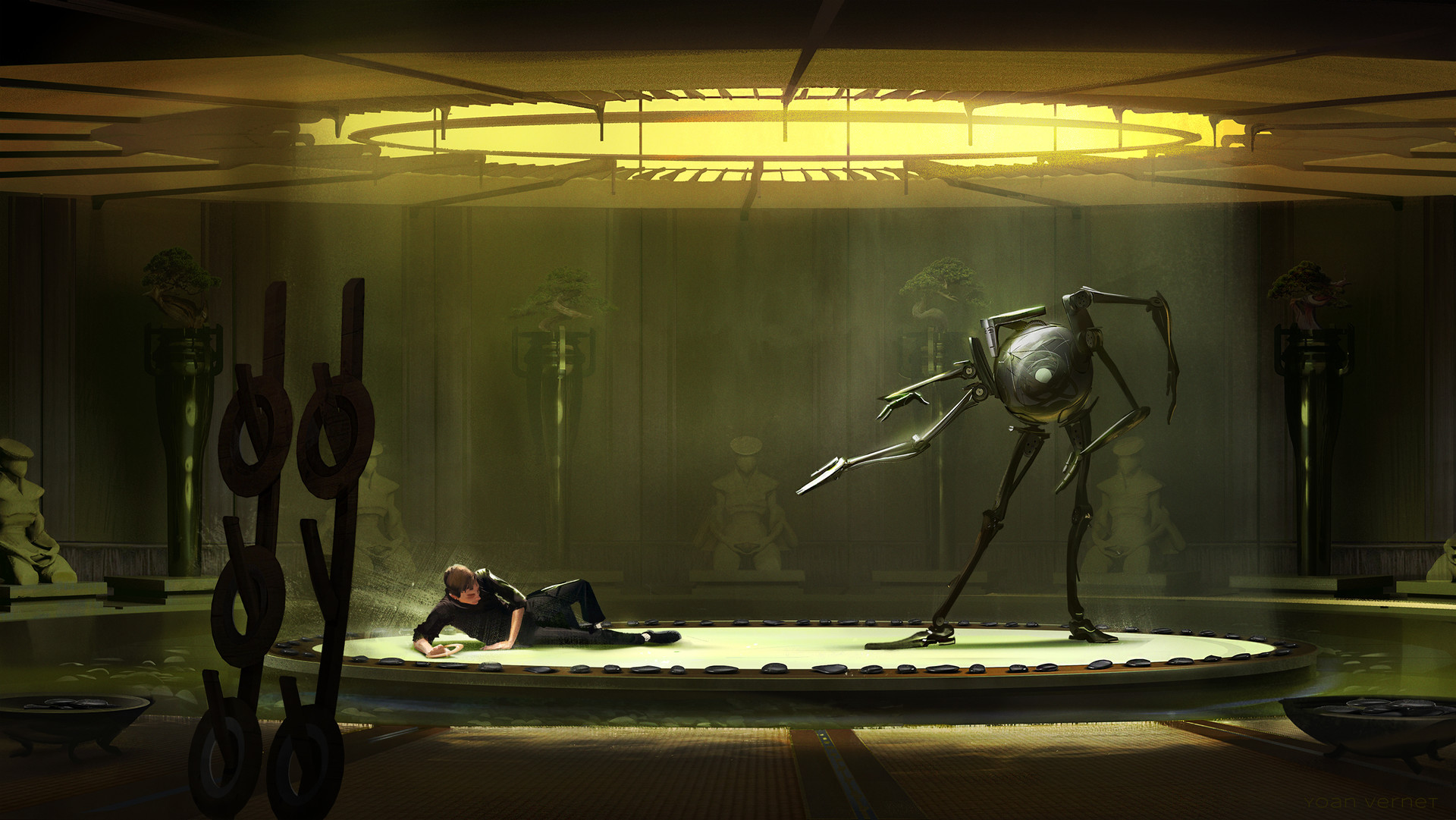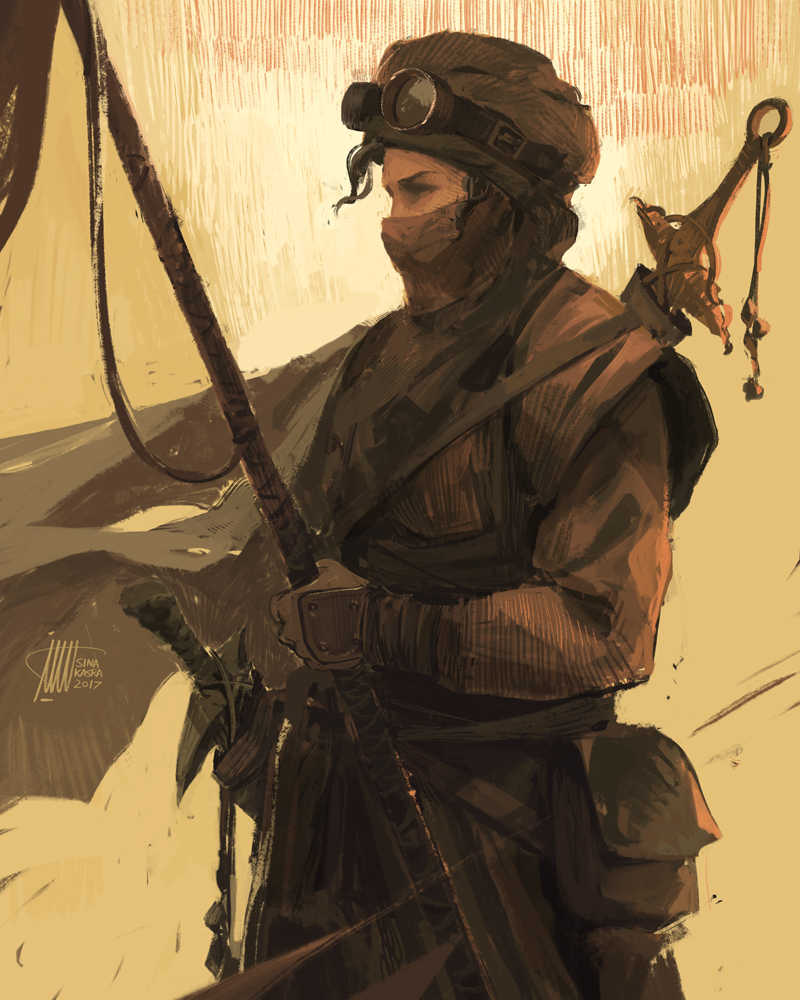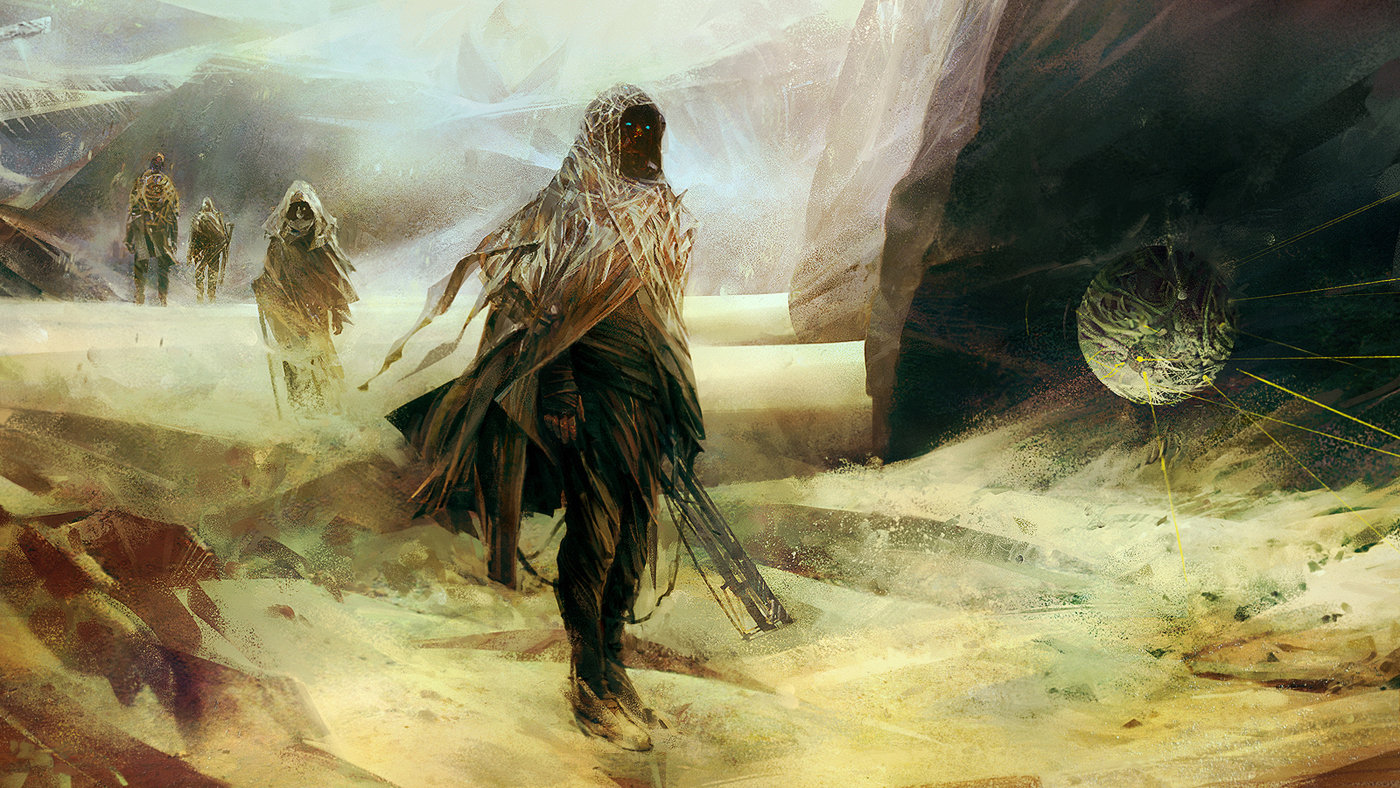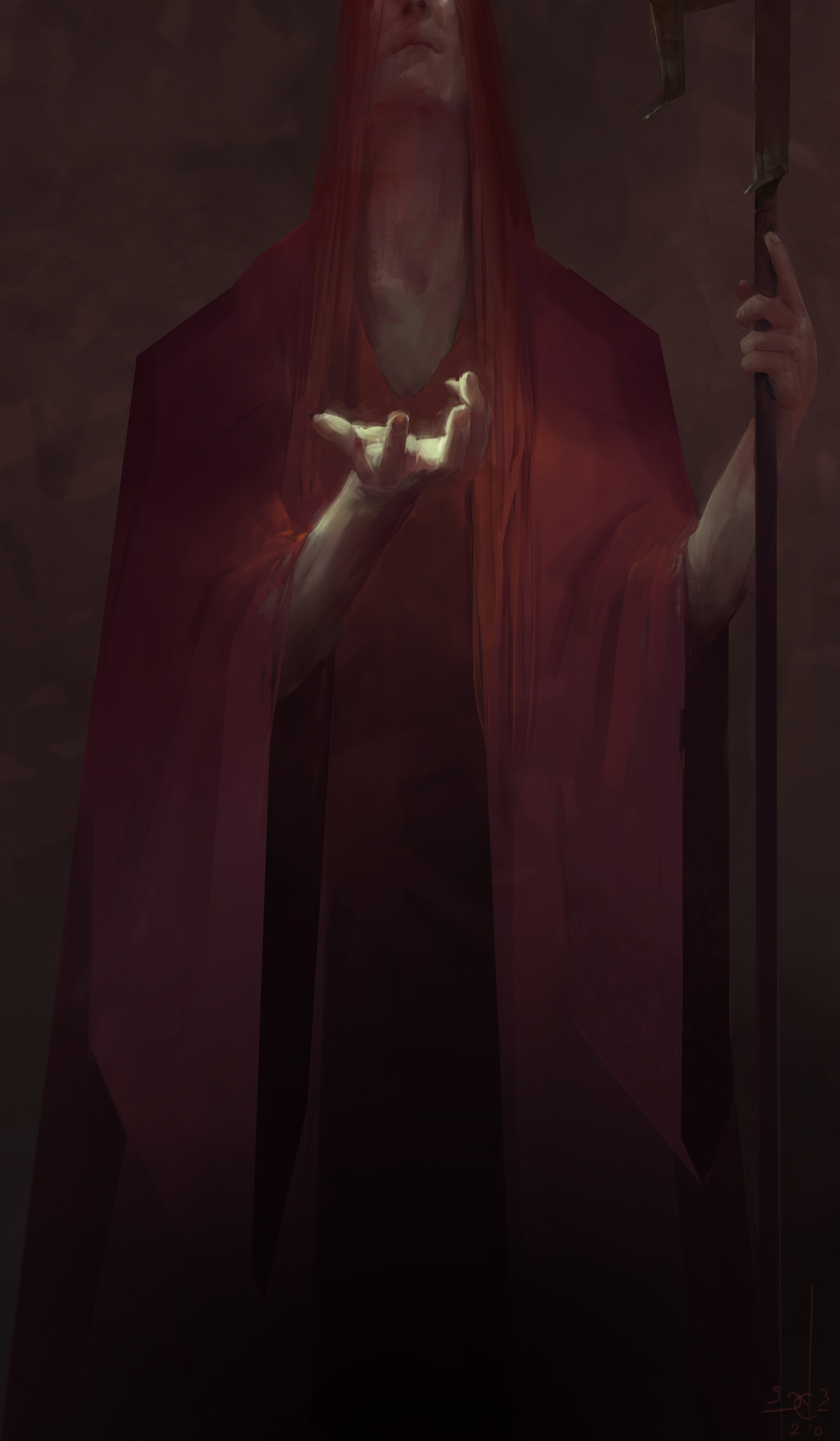The Desert Folk of the Shiga-Zann
Remnants, To Dust
"You will sleep, and be forgotten,As could easily be implied, the Voyage - the centuries-long journey from the last home of humanity to this - was not culturally stunting or philosophically monotonous; it was not a static cryosleep or an impotent sojourn. Contrary, the Horizons were each turned into a melting pot of their own unique civilizations and cultures. Factions came and went; conflicts were fought and lost; new traditions were founded, new ethnicities emergent. The Shiga-Zann were one such ethnicity, and more. An entire culture founded on zealous loyality and rigorous tradition. Once obscure for their minor technological ability, now famed for their utter prowess in armed conflict.
You will awake, and remember,
You will descend into the pit, and live again,
You will rise to greatness, and be smote to dust."
-Lines 17348-17351 of The Seventh Scripture, holy book of the Shiga-Zann
Violent Evolution
And then, for a little while, none shall withstand thine might,No one is quite sure how many Horizon spaceships left humanity's former home, bound for Sine. Some say it was in the hundreds, but the most reliable records point to a number closer to 50. Only ten arrived on the planet. The reason for the other ships being lost to the darkness between the stars is not wholly ascertainable, but it is not difficult to guess: armed conflict. A single misplaced bullet, a stray explosive, a malfunctioning weapon emplacement, all could spell doom for one of the ships. Most scholars say that on the Others, as they are known, the pure hubris exemplified during the Halley Wars was merely unable to be held back long enough for the ships to survive. For some of the ships, like Liszt, the conflict could be smoothed over, avoided for the betterment of humanity. For others, however, the art of killing had to be reforged by circumstance. On seven out of the ten ships, the unique environment had independently led to a reemergence of melee weaponry and combat. The ship - and later, of course, city - of Somnambulant is possibly the most unique instance of this, due entirely to the Shiga-Zann. It is said that near the turn of the first century since Departure, a lack of supplies and an overabundance of conflict had led to rioting and mobs, but the same shortage of supplies - and a few inklings of level-headedness - prohibited any open fighting.
Your fist will be of light, your sword of radiance,
Yet, only for a little while.
-Line 2031-2033 of the Seventh Scripture, holy book of the Shiga-Zann

by Yoan Vernet
Origins on Obscurity
No one truly knows what led to the Shiga-Zann's emergence. Before the development of Jito'Kei, they were an obscure, little-noted ethnic group inhabiting the lower levels of Somnambulant. Like many such groups, they were exploited as factory workers in their early years, but reforms led to them breaking off to form their own niche, producing commonplace but obscure technologies - very different from what they became. Very different from what they are today.Deserters
But when they arrive at Paradise, they will not recognize it,After they were overthrown, the Shiga-Zann never regressed to their former obscurity, simultaneously never attained their power. They withdrew from the happenings of the ship, seemingly content to build their own culture, uphold their own traditions, and see to their own people. That all changed when the ship arrived on Sine, and reestablished communication with the other Horizons. The Shiga are said to have foreseen the Halley Wars, for when this ocurred, the entire people - every man, woman, and child - forcefully seized control of two ancient cruisers and descended to the surface, disappearing into the equatorial deserts of the planet surface. Throughout the Halley wars, the Shiga-Zann retreated further into the wastes, stealing supplies from whichever faction militia dared venture near their territories. As the wars made the surface increasingly uninhabitable, sightings of the Shiga became more and more infrequent, until they had all but disappeared, nearly forgotten. It's been over a decade since the wars officially ended. In the time since, the Shiga-Zann have reemerged, somehow surviving alone in the desert. They are the founding clan of the Federation of Nomads, integral to its existence but also entirely separate from it. They are the only ones in all of Sine who are able to survive the wastelands of the surface without shelters, to weather the gas storms without dura-tents.
For their eyes will be too clouded by the Krana-maul, the darkness of God,
And their swords shall be wreathed in black fire and white death,
And Paradise will be no more.
-Lines 11215-1122 of The Seventh Scripture, holy book of the Shiga-Zann; named "The Comet" for unknown reasons
Culture, Taboos, and Traditions
The Shiga-Zann have always been known to be distinctly withdrawn from other cultures and societies. Members of their tribes that do interact with the outside world are known to be reserved and quiet. Whether this reservation stems from xenophobia or some other, unknown cause is not able to be ascertained, though the Shiga-Zann are not known to be overtly hostile to any one faction or culture. Regardless, their withdrawn nature means that not as much is known of Shiga-Zann culture as many others. What can be gathered is often unreliable, collected by scholars who must ply stories out of drunken travelers and decrepit survivors of the Halley wars. Sometimes, however, there are common threads that can be found in these inherently unreliable stories."And Thus and Poet Spoke"
Perhaps the largest source of knowledge regarding Shiga-Zann culture is the Seventh Scripture. It is unsure how old of a text the book is, but it is predicted to have been written - or given to the Shiga-Zann, depending on who you ask - relatively soon after Departure. No one is sure who exactly penned the holy book of the Shiga-Zann, and stories vary even among the desert peoples themselves. The more prevailing tale is that the book was a gift from the Intruments themselves. More pragmatic scholars say that the book is simply an amalgamation of other, pre-Departure texts, organized by Jezoret (see sidebar).
by LIN
Traditions and Lifestyle
Taboos
The Shiga-Zann, while not apparently close-minded, live their lives according to a stringent tradition that has been passed down for through generations for centuries. Breakings with these traditions are very often punishable, but some moreso than others. Partnership in the Shiga-Zann culture is for life. Adultery is considered the worst betrayal of the most complete trust, and domestic violence is punishable by death. For the Shiga-Zann, love and partnership is unquantifiably complex, involving commitment and trust that is not inherently human. To take on such an inhuman level of trust, and then break from it, is one of the worst things you can do."You will see true ease, and true trial,
True life, and true death,
True war, and true peace,
True paradise, to be squandered,
True waste, to be rebuilt,
True creation, and true destruction,
True darkness, and true light,
And when oblivion is gone and knowledge is lost,
Only the Shiga-Zann shall remain.
-Lines 1-9 of The Seventh Scripture, holy book of the Shiga-Zann; among the non-superstitious, it is only notable in that it is the only place in the entire text where the Shiga-Zann are directly mentioned

by sinakasra
Scrapper's Bane
Scrappers are loosely organized, often-exploited explorers, hired out by large corporations at a pittance for their efforts, to journey down from the Tori or up from the Stations to the surface, scour the wastes for any - or at any rate, any useful - leftovers from the Halley Wars - technological ones, that is. The aftereffects of the wars are more than obvious when you are on the surface. These Scrappers, sometimes travelling solo, but more often working in groups as large as a dozen, face many dangers: gas storms, mutated fauna, still-volatile armament from the wars, and more. But despite these plethora of dangers, there is one things that most Scrappers do not fear: other humans. While there are occasional scuffles between Scrapper groups over particular valuable finds, Scrappers of both Station and Tori, as well as any other surface dweller like the Nomad Federation, share a greater camaraderie that somewhat trascends faction alignment. As such, conflict with other humans is rare. Except for the Shiga-Zann."They fight like animals. I don't think any one of us landed a hit on them, and they were using knives. God. It was terrifying."Conflicts with the desert folk are not common. Most better-informed and less-desperate gangs understand which areas of the surface are under the protection of the Shiga-Zann, and duly avoid them. But sometimes, a Scrapper group will stray too far into Shiga-Zann territory, or will desecrate a strange shrine, or will trample underfoot a small plant. The tales of such groups are never quite certain. All that is ever left behind is corpses. Thankfully, such attacks are relatively rare, especially when Scrappers stay out of Shiga-Zann territory, but they seem to be becoming more and more common. Most say that the Shiga-Zann are running low on supplies, and this would certainly be supported that most gear is stolen from Scrapper corpses who have had a run-in with the Shiga-Zann. Despite the visceral reality of it all, Shiga-Zann attacks are a distant threat in most Scrappers' minds. The deadliness of an attack has given the events themselves a superstitious aspect, to the point that some Scrappers refuse to even admit that the stories are any more than rumors to cover up embarassing blunders of incompetent Scrappers that had unfortunate results. Of course, they are wrong. Very few Scrappers who survive a Shiga-Zann attack - a conditional that is rarely met - ever voluntarily choose to venture again to the surface.-A former Scrapper, having survived a Shiga-Zann attack
"The desert it ours. Do not return to this place, or we shall not be so merciful."-Interactions With the Shiga-Zann, chap. 4
The Tale of Jezoret
"The mere fact that some even entertain the notion of the text being divinely inspired is proposterous. The origin of the book can be clearly and definitively traced back to The Poet's life and emergence. Nothing more, nothing less."Among the Shiga-Zann peoples, the story of the exact origins of the Seventh Scripture varies between family and denomination, but the most common iteration is regarding Jezoret the Poet, also called the First Prophet. It is said that before Jezoret, the Shiga-Zann were nothing like they are today. Culturally stunted and exploited for their physique and acumen, most Shiga-Zann lived hard-working lives, barely surviving in the cloying factories of Somnambulant. That all changed when Jezoret emerged. Born to two Shiga-Zann factory workers, Jezoret grew up with a uniquely emotionally removed view of the world, assessing it as it was, not as he wished it to be. Jezoret became a renowned poet in the lower and mid levels of the ship; his writings and proverbs taught contentment and acceptance of hardship, emphasizing loyalty one's people over the furthering of their betterment.-A particularly pragmatic scholar
You shall not find meaning in power or peity, coin or caste,By most on the ship, Jezoret's teachings were thought of as profound, but impractical , but among his own people, they took a hold, revolutionizing the Shiga-Zann culture. As the story goes, the Instruments took a liking to Jezoret's teachings. Some say he was always their prophet, others that he was the physical manifestation of one deity or another, but the end result is that they seemingly bestowed upon him the Seventh Scripture. The Shiga-Zann of today base their entire lifestyle and culture off of the teachings and prophecies of Jezoret and the Seventh Scripture. Jezoret was said to have spent the rest of his days spreading his beliefs and building up his people, sometimes under persectution. He purportedly died in a freak airlock accident, which many Shiga-Zann claim to have been due to foul play, making Jezoret not only the First Prophet, but also the First Martyr.
But it is in love and death, and feeling and darkness,
It is there great Intent is found.
-An early poem of Jezoret
Remove these ads. Join the Worldbuilders Guild










Comments
Author's Notes
If you legitimately read all that, here is a cookie for your efforts :)